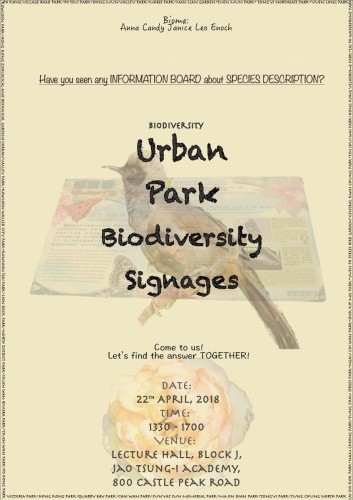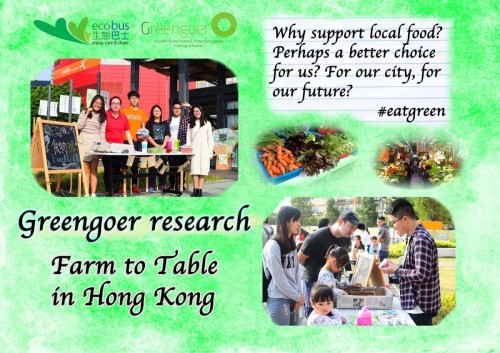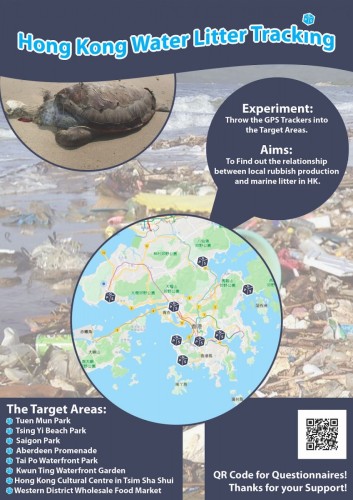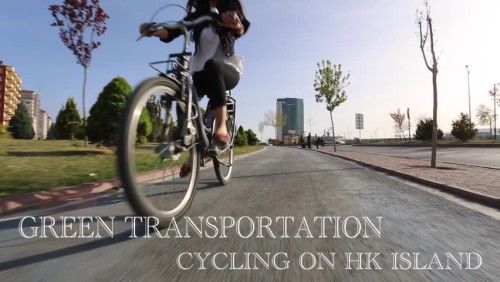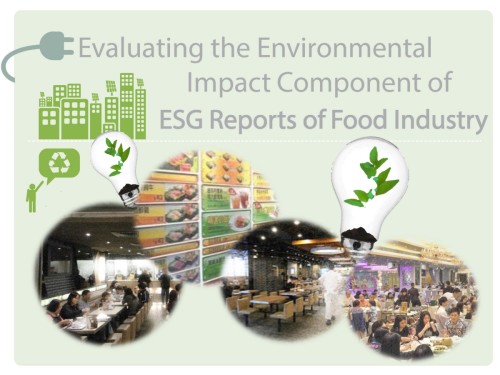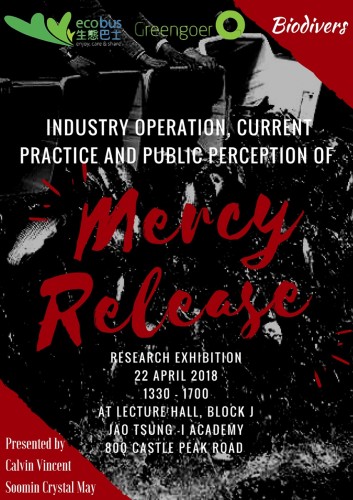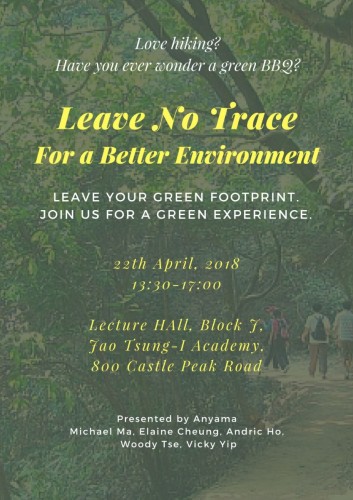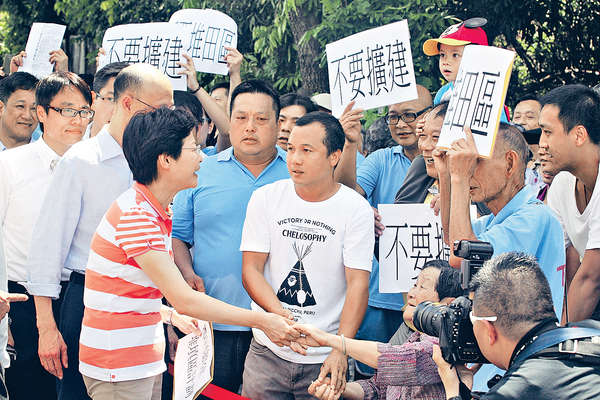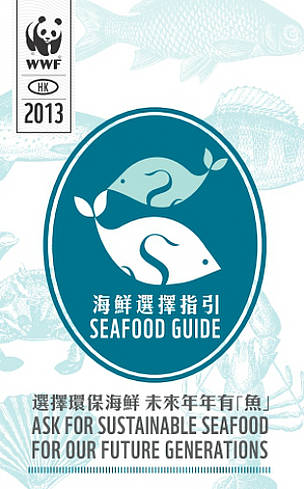A mini-symposium will be held on 22 April 2018 from 1330 to 1700. In the symposium, Greengoers will share with you about their research outcome of the socio-environmental research focusing on various issues. For details about the symposium, please visit: http://www.ecobus.org.hk/site/greengoer-1718-symposium/
Greengoer is a group of environmental leaders from different local university. From Dec 2017, they have conducted socio-environmental research focusing on various issues. The following are the abstract of their socio-environmental research in different environmental topics.
1) Biodiversity education: species signages in urban park
2) Farm to Table in Hong Kong
3) Enhancing Package Recycling in Hong Kong: Case Study of Snacks Packaging
4) Hong Kong Waters Litter Tracking
5) Green Transportation: Cycling on Hong Kong Island
6) Evaluating the Environmental Impact Component of ESG Reports of Catering Industry in Hong Kong
7) Mercy Release: Industry Operation, Current Practice and Public Perception
8) Environmental Behaviour of BBQ Site’s Users in Country Park
Greengoer 17/18 – Mini-symposium on Socio-environmental Research cum Graduation Ceremony
Date: 22 April 2018 (Sun)
Time: 1330-1700 (Registration starts at 1315)
Venue: Lecture Hall, Block J, Jao Tsung-I Academy (800 Castle Peak Road, Kowloon)
http://www.ecobus.org.hk/site/greengoer-1718-symposium/
Registration
Places are limited, register now:
https://goo.gl/forms/ql4QVIAMIj1JNgMT2
1) Biodiversity education: species signages in urban park
The primary purpose of the research aims to access the effectiveness of species signages in nurturing citizen’s knowledge about urban biodiversity. A species signage is an information board that provides viewers descriptions about the species available. The level of utility of the species signages are inferred from the questionnaires that we have conducted in four urban parks in Hong Kong, namely, Kowloon Park, Victoria Park, Yuen Long Park and Lai Chi Kok Park.
It is founded out that factors like insufficient number of the species signages, low readability of species signages and inconvenient location of the species signages are hindering the utility of the board in educating the public about species recognition and urban biodiversity. Multiple approaches in improving the condition thus are suggested, and they include increasing the density of species signages and introducing in Augmented Reality (AR) to promote interaction.
Researches and studies about species signages are lacking in the field. Lastly, this research is hoped to serve as an initiative and preliminary research over the issue and raise the awareness of relevant non-governmental organisation or governmental department.
2) Farm to Table in Hong Kong
This research, it is studying the opportunity and difficulties of farm to table restaurants in Hong Kong. In this research, it will conduct literature review with over 3 0 scientific article and research, the questionnaire with the public for shopping habit about the local food, interview with the farmer and the restructure owner, also do some farmer market site visit. And the process of the data analysts, it finally the research is to make a poster about the food miles between local vegetables and imported vegetables. This research will gather the information of the way about the local vegetables distribute to the market and seasonal sustainability so as to encourage people to eat green which can help to reduce food miles. Moreover, a marketing research will be conducted to find out the willingness of the public to pay for the “green” vegetables in order to provide the reference for the farmers to adjust the vegetable prices to a reasonable and affordable level. After this research, it is hoped that more people can enjoy a green eating habit, also to reduce the carbon emission from the food transpiration and fight for the global warming. Also, provide some of the suggestion about policy for supporting the promotion of the local food.
3) Enhancing Package Recycling in Hong Kong: Case Study of Snacks Packaging
Packaging waste is a serious problem in the world. Most packaging, which use plastics, are non-biodegradable and often causes undesirable consequences like marine litter. Laminated packaging and composite materials also increase the difficulty of recycling and reuse. Snacks, which are commonly found with individual or small packaging is chosen as the study target on the issue. In this study, snacks consumption behaviour, package recycling knowledge and views regarding packaging material labels of households are assessed. Snacks packaging issue in Hong Kong is also evaluated based on packaging layers, packaging weight, packaging volume, packaging materials, presence and effectiveness of packaging labels of various snacks sample. The findings reflected consumer’s awareness on the packaging wastes produced by snacks and their choices before purchasing. Also, suggestions of enhancing the current recyclability of snacks packaging are made in the study.
包裝廢物在世界各地也是個嚴重的問題。大部分包裝均會全部或部分使用塑膠。可是,塑膠需要長達千年才可能完全分解,處理不當時經常造成海洋垃圾等問題。現時很多包裝會使用層壓包裝或複合材料包裝等,這樣會增加其回收難度。這調查希望透過了解家居零食消費習慣、市民對包裝物料標籤的認識以及量度零食包裝的重量體積和物料等,尋求更理想、更環保的包裝設計及標籤。
4) Hong Kong Waters Litter Tracking
Nowadays, the problem of marine debris in Hong Kong becomes more serious. According to the marine litter research resulted from the Working Group on Clean Shorelines organized by the Hong Kong Government, it has indicated that there were 15,000 metric tons of marine litter in Hong Kong each year, and over 95% are sourced locally. Environmental groups have criticized that Hong Kong’s coastal garbage was unsatisfactory because it is always based on the related-department(s) to clean up the fragmented marine litter. There is no constancy and formulation of effective policies and resources to deal with garbage, often only after receipt of a complaint sent to clean up, coupled with lack of resources. The problem of beach pollution in Hong Kong must be solved by the volunteers. After observing the problems of marine litter in Hong Kong, the purpose of this research is to study the public awareness towards the local marine litter pollution problem, and to simulate the route that the rubbish would go if they are thrown in/near the experimental regions and thus to evaluate the relationship between local rubbish production and marine debris found in Hong Kong waters. Therefore, we use random-based questionnaire and marine tracking experiment to implement
our research.
5) Green Transportation: Cycling on Hong Kong Island
In this research project, we aim to investigate how cycling facilities (eg. shared bicycles and cycling roads) affect the willingness of residents on Hong Kong Island to use bike as their main mean of transport. We conducted online survey, random sampling survey at bus stops and interviewed with interested participants in Shau Kei Wan and Wong Chuk Hang .
Through analyzing the responses from survey, it is found that cycling facilities have significant impact on cycling habit of people. For instance, the majority of people don’t own a bike themselves and it reduces their incentives to ride bike. Therefore, shared bikes could be a way to solve the problem. According to our survey results, more than 40% of respondents agree that shared bikes can indeed increase their incentive to bike.
In fact, by making simple changes to our habits in daily life, such as choosing cycling over motor vehicles, various benefits could be made . Including the decrease in carbon footprint, air pollution as well as alleviating global warming.
在這個研究項目中,我們旨在研究單車設施(例如:共享單車/單車徑)對香港市民在港島以單車代步的意願的影響。我們進行了線上調查以及在巴士站進行隨機抽樣調查,並與筲箕灣及黃竹坑有對單車有興趣的人士面談。
在收集和分析問卷數據後,我們了解到在港島推廣單車的各種困難。例如大多數人也沒有擁有單車,因此他們騎自行車的動機亦隨之減少。針對這問題,共享單車便可能是個解決方法,而且問卷調查亦顯示多於40%受訪者同意共享單車能增強他們以單車代步的意欲。
實際上,通過改變日常生活習慣,例如使用零碳自行車代替駕駛車輛,便可減少碳足跡,環境污染解決氣候變化問題。
6) Evaluating the Environmental Impact Component of ESG Reports of Catering Industry in Hong Kong
In 2016, Hong Kong Exchanges and Clearing Limited (HKEx), has decided to strengthen the Environmental, Social and Governance Reporting Guide (the ESG Guide or Guide) in its Listing Rules (Rules). Each listed companies must publish their ESG report in each financial year.
However, in Hong Kong context, the HKEx guideline for ESG reporting is lopsided and vague. The quality amongESG reports may have immense differences in terms of relevance, quantity and level of disclosure of content. Meanwhile, as reports of low quality would be accepted to be published, the original aims of ESG report become meaningless.
This research aims to find out the relationship between the written performance in the environmental aspect in ESG reports, the actual performance in environmental aspect and company size. Catering industry was chosen to be the entry point of analysis.
In the meantime, this research manifests its significance in attempting to address the qualitative shortfall in HKEx ESG reporting guide, as the improvement to current ESG reporting would be further suggested. Also, the choice of catering industry for this research, which highly embraces environmental impacts in its business, would encourage the implementation of higher standard sustainability policies, so as to boost ESG performance and to buildbetter capacities in attracting potential investors.
7) Mercy Release: Industry Operation, Current Practice and Public Perception
Mercy release refers to the Buddhist / Taoist ritual of releasing captured animals to the wild. Releasers consider this to be an act of compassion, which may bring good karma and fortune to them in return. According to studies, however, mercy release may cause ecological impacts, such as introducing foreign species, spreading of foreign parasites and diseases into the original habitat.
After the outbreak of avian flu, seafood becomes one of the main target of release in Hong Kong. (KFBG, 2015) Some past studies focused on the release of pet birds. (Chan, 2006) Since then, very few studies were carried out. As a result, our group chose release of marine life as our target. In our research, we consulted members of three environmental groups for their points of view and some latest trend on the issue. Through email interview of a Buddhist group and literature review, we studied the Buddhists’ perspective on their own ritual to evaluate changes in their awareness and mindset. An online survey was done to evaluate the perception of the general public over release practice and business. Finally, we participated in a mercy release boat trip at Tsuen Wan to obtain first-hand data, including the amount of animals to be released, the number of mercy release boats in operation at the release spot etc. The boat operator and the seafood supplier of the Buddhist group were also asked about the scale and process of the operation.
8) Environmental Behaviour of BBQ Site’s Users in Country Park
Agriculture, Fisheries and Conservation Department (AFCD) collects over 3,000 tonnes of waste from Country Parks every year and HK government is constantly promoting tourisms of visiting natural landscape no matter for local or foreign visitors. It is questionable whether the level of environmental awareness of visitors is high enough? Can a balance found between the number of tourists and countryside environment? In the meantime, AFCD has proposed “Take Your Litter Home” Scheme since 2015. It is the time to assess the effectiveness of the scheme and understand the environmental ethics standard of the visitors using the Country Parks so as to get ready to be prepared for the Blueprint for Sustainable Development in HK.
We are now looking into the environmental ethics of visitors in terms of their behavior in the barbecue sites to evaluate visitor’s awareness on environmental protection and sustainable living lifestyle. Some acts were found among visitors while there are actually different ways to do goods to the environment. Come and have a look if you want to know more about how citizens are coping with the “Leave No Trace” Campaign and our experience on shop naked. You may find living green interesting and inspiring.

